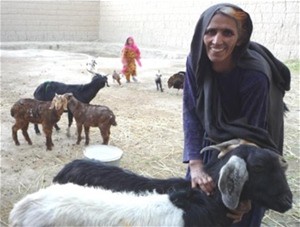
Mapari from Lokhai, Nangarhar, can now provide for her children and send them to school as a result of SPR community grants.
USAID/IRD/SPR-SEA
USAID Strategic Provincial Roads program assists women earn a living to support their families as well as engage in public life.
23 SEPTEMBER 2010 | LOKHAI VILLAGE, NANGARHAR PROVINCE, AFGHANISTAN
After 30 years of war, many Afghan families lost their primary income earners: their fathers, husbands, and sons, leaving widows and children to fend for themselves with limited skills or resources.
Mapari and her five children from Lokhai Village in Eastern Afghanistan’s Nangarhar Province are one of these families. Her husband died as a result of conflict, leaving her with little land, few skills, and a family to feed.
Mapari had one cow that provided milk for the entire family. When the cow died depriving her of milk and yogurt, it was very hard to feed her children. Mapari’s situation improved after becoming one of 1,200 beneficiaries receiving goats from a USAID Strategic Provincial Roads (SPR) community grants program.
The SPR program worked in close collaboration with the Government of the Islamic Republic of Afghanistan (GIRoA), rural communities, and village leaders to identify needs for quick impact rural development projects in Eastern Afghanistan. As a result, a large community-based grants program was established to provide livestock assistance to villages and disenfranchised families along targeted road alignments.
Designed in collaboration with the GIRoA, USAID’s SPR program takes a holistic approach to development, building roads in tandem with the development of local agricultural communities that live alongside these strategic provincial roads.
Mapari is delighted that she can now provide for her family. “The goats provide four kilograms of milk each day, half of which we consume and the rest we sell in the local market for 80 Afghanis (approximately $1.75), providing us with savings that allow my children to study instead of work,” said Mapari.
Rural development projects such as this one empower women and children, and foster support for USAID constructed roads.







Comment
Make a general inquiry or suggest an improvement.